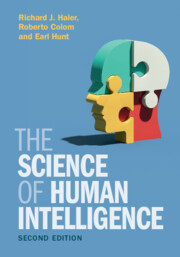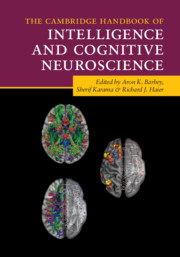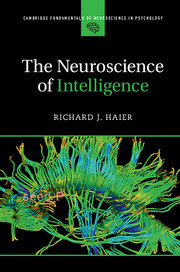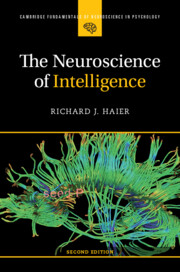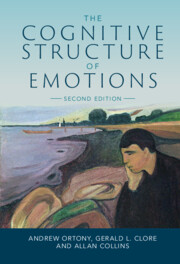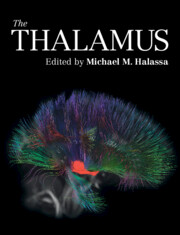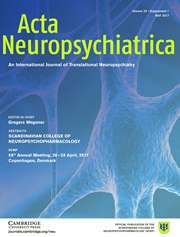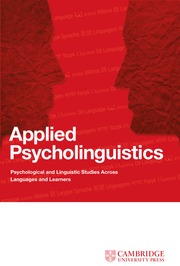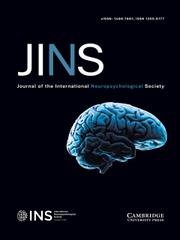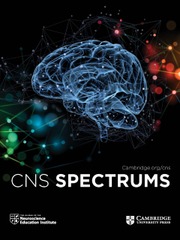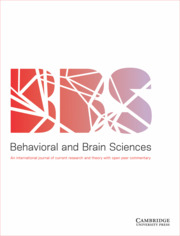The Science of Human Intelligence
2nd Edition
- Authors:
- Richard J. Haier, University of California, Irvine
- Roberto Colom, Universidad Autónoma de Madrid
- Earl Hunt, University of Washington
- Date Published: August 2023
- availability: Available
- format: Paperback
- isbn: 9781108701969
Paperback
-
In this revised and updated edition of Hunt's classic textbook, Human Intelligence, two research experts explain how key scientific studies have revealed exciting information about what intelligence is, where it comes from, why there are individual differences, and what the prospects are for enhancing it. The topics are chosen based on the weight of evidence, allowing readers to evaluate what ideas and theories the data support. Topics include IQ testing, mental processes, brain imaging, genetics, population differences, sex, aging, and likely prospects for enhancing intelligence based on current scientific evidence. Readers will confront ethical issues raised by research data and learn how scientists pursue answers to basic and socially relevant questions about why intelligence is important in everyday life. Many of the answers will be surprising and stimulate readers to think constructively about their own views.
Read more- Clearly written and organized for capturing readers' attention
- Numerous figures and images illustrate key findings visually
- Includes interesting real-life examples aimed at connecting the scientific findings and their relevance in everyday life
Reviews & endorsements
'A riveting survey of modern research to unlock the nature and biological foundations of human intelligence by pioneers in the field.' Aron K. Barbey, University of Illinois at Urbana-Champaign, USA
See more reviews'The Science of Human Intelligence by Richard J. Haier and Roberto Colom is probably the best book about human intelligence ever written. It comes as the second edition of Human Intelligence, written by Earl Hunt 12 years ago. Hunt's book was already a great text, which influenced research and teaching in the field considerably. This edition is much more than Hunt's book. It covers virtually everything we know about human intelligence: it provides an accurate and up-to-date picture of research findings and ideas, including the history, and the current cognitive and psychometric models, of intelligence, and summarizes and evaluates research on the brain, and the genetic, cultural, and environmental bases of intelligence. It is strongly suggested to anyone who wants to know how the human mind works and why humans differ on many of its functions.' Andreas Demetriou, University of Cyprus
'Human intelligence is the major adaptive mechanism for humans. If humans and this planet are to survive, it will be important that we understand and optimize our intellectual capabilities. This book presents our current best understanding of human intelligence and how it should be studied.' Douglas K. Detterman, Psychologist, USA
'To update Hunt's book must have been a challenging job. Roberto and Richard did so dexterously by inserting new and solid information. The result is a delightful book full of important information for those who want to learn from the best researchers in human intelligence.' Carmen Flores-Mendoza, Federal University of Minas Gerais, Brazil
'Perennially, there have been too few higher-level textbooks devoted to human intelligence differences. This engagingly voiced book is commendable as clear, current, comprehensive, and cautious.' Ian Deary, University of Edinburgh, UK
'An excellent textbook that will leave readers with an informed and nuanced grasp of core and emerging findings in intelligence research. Drs. Haier and Colom succeed in presenting complex topics accessibly, and in modeling the commitment to scientific-mindedness and respectful discussion that is critical to progress in understanding human intelligence.' Matthew Euler, University of Utah, USA
'The Science of Human Intelligence is a superb book. It provides an authoritative review of what is known about human intelligence, from its measurement to underlying brain systems to real-world consequences. The approach is balanced and up to date and does not shy away from controversial topics. This is a highly recommended must-read for anyone interested in the facts about human intelligence, and is appropriate for undergraduate and graduate students, as well as professionals who work in related areas, and the educated public.' David Geary, University of Missouri, USA
'The Science of Human Intelligence is a great book. It provides a wealth of up-to-date scientific information and a comprehensive, thoughtful, and balanced evaluation of what is known, what is not known, and what still needs to be learned about human intelligence. It also provides much food for thought for those who are willing to learn from open discussions and even from constructive confrontation of competing ideas. It will answer many questions that readers might have about intelligence. More importantly, it will help them to ask new questions that they have not yet thought of.' Yulia Kovas, Goldsmiths, University of London, UK
'A towering accomplishment! Human behavior can be better understood when variation in intelligence is considered. Engagingly written and packed with constructive insights, this book should be considered a must-read for advanced undergraduates and all persons interested in how post-industrial societies are structured. I expect many of its older, open-minded readers will feel educationally cheated if unexposed to this vibrant scientific arena earlier in their lives. Throughout, the authors demonstrate how many current explanations of human behavior that neglect the vast range of individual differences in cognitive functioning are untenable. If such problems as climate change, cyber-insecurity, educational-occupational disparities, pandemics, and even finding a fulfilling life are to be addressed realistically and humanely, individual differences in cognitive functioning must be considered. This book is the field as it now stands.' David Lubinski, Vanderbilt University, USA
'With their 75 years of combined research experience in the field of intelligence, no other pair of authors could have written such an authoritative and comprehensive book. It lucidly covers the theories, methods, and results of intelligence research, from the environment and training to genes and the brain throughout the life course. Clear and engaging, the book doesn't shy away from controversial issues. Highly recommended.' Robert Plomin, King's College London, UK
'This book critically analyzes research on human intelligence, distinguishing between science and politics. The authors admit that much still remains to be discovered and therefore address all those aspects easily susceptible to manipulation in a balanced way. This is an important merit of this book.' Aristide Saggino, University of Chieti-Pescara, Italy
Customer reviews
Not yet reviewed
Be the first to review
Review was not posted due to profanity
×Product details
- Edition: 2nd Edition
- Date Published: August 2023
- format: Paperback
- isbn: 9781108701969
- length: 550 pages
- dimensions: 255 x 176 x 24 mm
- weight: 0.832kg
- availability: Available
Table of Contents
List of figures
List of tables
List of boxes
Preface
Acknowledgements
1. A brief voyage to the past
2. Basic concepts
3. Psychometric models of intelligence
4. Cognitive models of intelligence and information processing
5. Intelligence and the brain
6. The genetic basis of intelligence
7. Experience and intelligence
8. Intelligence and everyday life
9. Introduction to the scientific study of population differences
10. Sex differences and intelligence
11. Intelligence and aging
12. Intelligence in the world
13. Enhancing intelligence
14. A final word
References
Index.
Sorry, this resource is locked
Please register or sign in to request access. If you are having problems accessing these resources please email [email protected]
Register Sign in» Proceed
You are now leaving the Cambridge University Press website. Your eBook purchase and download will be completed by our partner www.ebooks.com. Please see the permission section of the www.ebooks.com catalogue page for details of the print & copy limits on our eBooks.
Continue ×Are you sure you want to delete your account?
This cannot be undone.
Thank you for your feedback which will help us improve our service.
If you requested a response, we will make sure to get back to you shortly.
×
